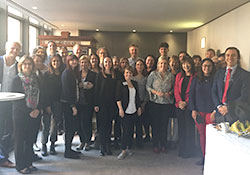Meeting of the WHO Action Network on Salt Reduction in the population in the European Region (ESAN)

WHO
The 2017 Meeting of the WHO Action Network on Salt Reduction in the Population in the European Region (ESAN) was held in Dublin, Ireland on the 9–10 May 2017. The Food Safety Authority of Ireland (FSAI) hosted the meeting, in close collaboration with the Swiss Federal Food Safety and Veterinary Office (FSVO) and the WHO Regional Office for Europe.
The Irish Minister of State for Health Promotion, Marcella Corcoran Kennedy, opened the first day of the meeting, acknowledging the importance of the event and the positive work of the FSAI and the food industry in implementing a voluntary salt reduction initiative in Ireland, since 2003.
Participants included representatives from 15 countries (Austria, Bulgaria, Estonia, France, Greece, Hungary, Ireland, Israel, Italy, Malta, Norway, Portugal, Slovenia, Sweden and Switzerland), WHO, the European Commission, and the Dutch National Institute for Public Health and the Environment (RIVM), as well as other external speakers.
The main objectives of the 2017 ESAN meeting were to:
- consider innovative approaches to measure salt intake using dietary assessment methods;
- discuss modelling the required reductions in the salt content of packaged food to achieve the global target of a 30% reduction in sodium intake, and the use of knowledge of consumption and composition to set salt targets for different product categories;
- explore forms of data that can be used to inform progress and monitor changes in composition of foods;
- look at alternative data sources such as consumer-generated data and big data from the food sector;
- share best practices and the types of action undertaken at national level.
About the action network
The network was established in 2007 with the support of WHO and the United Kingdom Food Standards Agency (FSA), and has been chaired by Switzerland since 2013. The network aims to: a) promote the identification and sharing of national policies on salt reduction and the types of action undertaken; b) explore, monitor and evaluate strategies of salt reduction initiatives; c) discuss the public health and cost benefits of salt reduction strategies in different countries; d) develop good practice in the area of policy development, implementation, monitoring and evaluation; e) promote the development of science and food technology in the relevant areas; and f) explore the links between salt reduction policies and inequalities.



